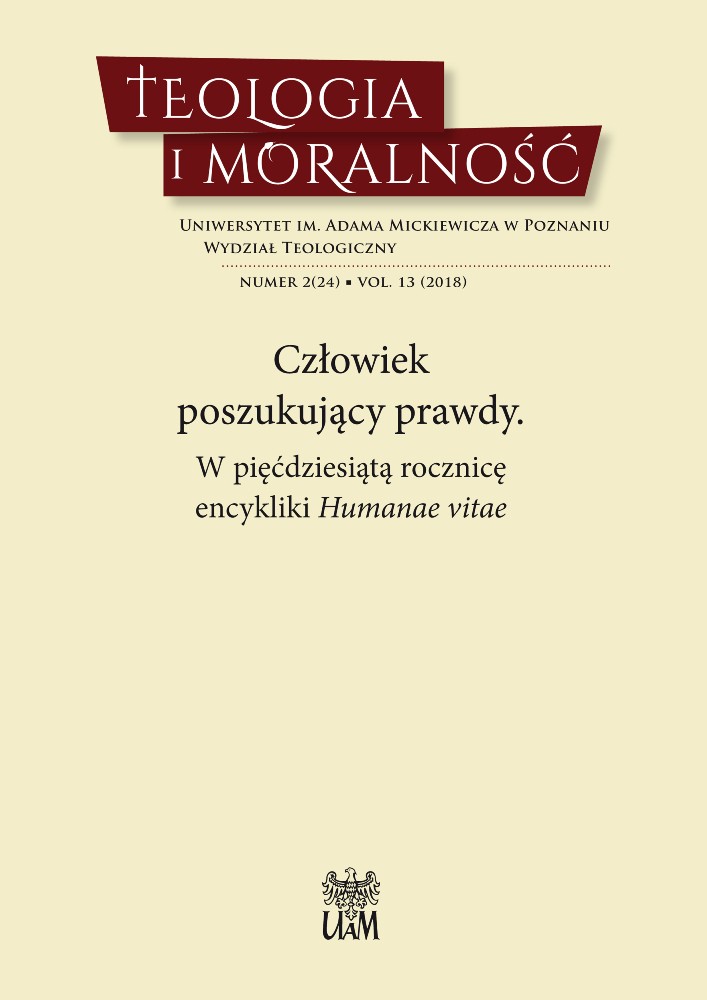Abstract
The author of this article explores the understanding of the message of the encyclical Humanae vitae based on three crucial points. The first one concerns the concept of human person. Unlike the evolutionary approach wherein the human being is thought under the aspect of its biological facticity, human person is viewed here as a “unitotality”, an indissolubly whole of the body and the soul whereby the human body has not only a function but also reveals a deeper meaning. The second point is the nature of the conjugal act. It exhibits the reciprocal gift of a man and a woman in their totality as persons. Due to this totality the two meanings contained in the conjugal act, namely the meaning of loving personal unity and the meaning of procreativeness should not be consciously separated. The matter is hereby not a bond between two things or biological facts but a bond between meanings. The objection of the naturalistic fallacy is also here unjustified. Finally the third point is the theological dimension which highlights that the double meaning of the conjugal act comes from God the Creator and as innate into the human nature and the nature of human love and as such should be respected. The contemporary controversy concentrates the question either the sexuality-conjugality-procreation nexus concerns every single conjugal act or if it might concern the marital life as a whole whereas the married couple can make some single sexual acts consciously unfruitful.
References
Bajda J. i in. (2012), Memoriał krakowski: uzasadnienie katolickiej nauki tyczącej podstaw moralnych życia małżeńskiego, Kraków 1968. Wprowadzenie do encykliki Humanae vitae, Kraków 1969, Poznań.
Chyrowicz B. (2015), Bioetyka. Anatomia sporu, Kraków.
Chyrowicz B. (2018), Twarda mowa papieża, „W Drodze” 7, s. 26-35.
David J. (1968), Zerreißprobe in der Kirche, w: Erstes Echo auf Humanae vitae. Dokumentation wichtiger Stellungnahmen zur umstrittenen Enzyklika über die Geburtenkontrolle, red. F. Oertel, Essen, s. 10-12.
Ernst S. (2015), Argumentationsmodelle in der theologischen Sexual- und Beziehungsethik, w: Zukunftshorizonte katholischer Sexualethik, Questiones Disputatae 241, Hrsg. K. Hilpert, Freiburg–Basel–Wien, s. 162-184.
Fraling B. (1995), Sexualethik. Ein Versuch aus christlicher Sicht, Paderborn–München–Wien–Zürich.
Fritz A. (2009), Der naturalistische Fehlschluß. Das Ende eines Knock-Out-Arguments, Freiburg–Wien.
Häring B. (1968), Krise um „Humanae vitae“, w: Erstes Echo auf Humanae vitae. Dokumentation wichtiger Stellungnahmen zur umstrittenen Enzyklika über die Geburtenkontrolle, red. F. Oertel, Essen, s. 29-31.
Hertz A. (1968), Naturrechtsmetaphysik oder Heilsbotschaft?, w: Erstes Echo auf Humanae vitae. Dokumentation wichtiger Stellungnahmen zur umstrittenen Enzyklika über die Geburtenkontrolle, red. F. Oertel, Essen, s. 15-23.
Kasper W. (2018), Die Botschaft von Amoris laetitia. Ein Freundschaftlicher Disput, Freiburg–Basel–Wien.
Laun A. (2000), Liebe und Partnerschaft aus katholischer Sicht, Eichstädt.
Lintner M.M. (2018), Von Humanae vitae bis Amoris laetitia. Die Geschichte einer umstrittenen Lehre, Innsbruck–Wien.
Merecki J. (2018), Pokochać ludzką miłość, „W Drodze” 7, s. 64-73.
Noonan J.T. (1986), Contraception. A History of its Treatment by the Catholic Theologians and Canonists, Cambridge MA–London.
Odin K.A. (1968), Zur Rechenschaft herausgefordert, w: Erstes Echo auf Humanae vitae. Dokumentation wichtiger Stellungnahmen zur umstrittenen Enzyklika über die Geburtenkontrolle, red. F. Oertel, Essen, s. 49-51.
Ratzinger J. (2007), Wprowadzenie w chrześcijaństwo, tłum Z. Włodkowa, Kraków.
Sgreccia E. (2012), Personalist bioethics. Foundations and Applications, Philadelphia.
Twomey V. (2008), Der Papst, die Pille und die Krise der Moral, Augsburg.
Schockenhoff E. (2016), Der Glaubenssinn des Volkes Gottes als ethisches Erkenntniskriterium? Zur Nicht-Rezeption der kirchlichen Sexualmoral durch die Gläubigen, „Theologie und Philosophie“ 91, s. 321-362.
Publikacje internetowe
Benedikt XVI., Ansprache an die Teilnehmer an dem von der Päpstlichen Lateranuniversität veranstaltete Internationalen Kongress über das natürliche Sittengesetz (12 II 2007), http://www.vatican.va/holy_father/benedict_xvi/speeches/2007/february/documents/hf_ben-xvi_spe_20070212_pul_ge.html [dostęp: 8.08.2018].
Benedykt XVI, Encyklika, która stałą się znakiem sprzeciwu. Przemówienie do uczestników kongresu z okazji 40-lecia encykliki Pawła VI „Humanae vitae”, https://opoka.org.pl/biblioteka/W/WP/benedykt_xvi/przemowienia/rocz_hv_10052008.html [dostęp: 5.08.2018].
Brandmüller W., Kardynał Walter Brandmueller o różnicy między opinią publiczną a zmysłem wiary, http://www.pch24.pl/kardynal-walter-brandmueller-o-roznicy-miedzy-opinia-publiczna-a-zmyslem-wiary,59475,i.html#ixzz5NaF3JRb2 [dostęp: 8.08.2018].
Franciszek, Posynodalna adhortacja apostolska Amoris laetitia o miłości w rodzinie, https://opoka.org.pl/biblioteka/W/WP/franciszek_i/adhortacje/amoris_laetitia_19032016.html [dostęp: 8.08.2018].
Jan Paweł II, Adhortacja apostolska Familiaris consortio o zadaniach rodziny chrześcijańskiej w świecie współczesnym, https://opoka.org.pl/biblioteka/W/WP/jan_pawel_ii/adhortacje/familiaris.html [dostęp: 8.08.2018].
Paweł VI, Encyklika Humanae vitae o zasadach moralnych w dziedzinie przekazywania życia ludzkiego, https://opoka.org.pl/biblioteka/W/WP/pawel_vi/encykliki/humane.html [dostęp: 8.08.2018].
Sinodo dei Vescovi, III Assemblea Generale Straordinaria le Sfide Pastorali Sulla Famiglia nel Contest dell’ Evangelizzazione. Instrumentum laboris, http://www.vatican.va/roman_curia/synod/documents/rc_synod_doc_20140626_instrumentum-laboris-familia_it.html [dostęp: 5.08.2018].
License

This work is licensed under a Creative Commons Attribution-NoDerivatives 4.0 International License.

